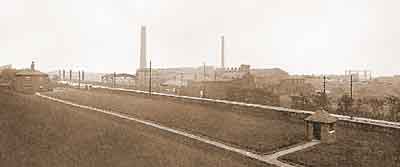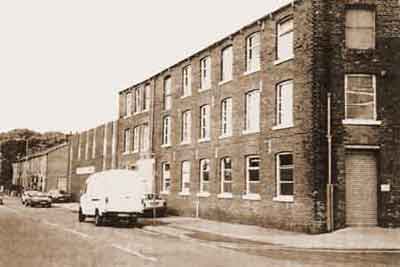Alpha Mill, Manchester Rd, Denton
Alpha Mill was a cotton-spinning mill on the south side of Manchester Rd on the opposite side of the railway line from Denton Goods Yard.
In 1862 Thomas Baxendell (1822-1909, aka Baxendale) leased land for its construction from the Earl of Wilton. At the time it was believed to be the first mill to be built in Denton,
hence the name Alpha Mill, but this was inaccurate as the first mill in Denton was Grove Mill on Stockport Rd.
The business was initially known as the Alpha Mill Co. The 1881 census records that Thomas Baxendell was then living at Rose Hill House, off Manchester Rd, and that he was employing 200 hands at Alpha Mill. By the end of 1883 he was bankrupt but he paid off his debts and continued in business. In 1891 the company was incorporated as the Alpha Mill Co Ltd, Company No. 35453.
Housing was provided for employees of Alpha Mill on the north side of Manchester Rd adjoining Denton Reservoirs. The row of houses fronting Manchester Rd was called Alpha Terrace and behind this there was a second row on Water St, which was connected to Manchester Rd by Jackson St.
Worrall’s Cotton Spinners Directory for 1891 lists Thomas Baxendell as occupying Alpha Mill on Manchester Rd, Denton. This company was listed as cotton spinners with supplementary capacity for doubling. At this time the company was operating 45,000 spindles and 328 twists where two or more yarns were twisted together.
A known fatality at Alpha Mill occurred in Nov 1903 when Albert Hirst, aged 22 years, a cotton spinner, was fatally injured in a fire. He was buried in Denton Cemetery.
In Nov 1865 there was a small fire in the mill but little damage was done. However, on the 22 Apr 1915 a major fire broke out and only the walls were left standing. As a result of this, a meeting of the company held on the 23 Jul 1915 passed a resolution that it should be voluntarily wound up. The chairman at the time was William Lewis Holland.
Subsequently, the building was repaired and in 1917/18 the Earl of Wilton leased it to H N Morris & Co Ltd (Herbert Newall Morris), chemical manufacturers. The name was then changed from Alpha Mill to Alpha Works. This company was incorporated in 1909 (Company No. 103517) and its origins lay in the Gorton Brook Chemical Works of West Gorton owned by Herbert Newall Morris. H N Morris & Co Ltd also had premises in Dickenson Rd, Rusholme; Norfolk St, Manchester; and Trafford Park. It was dissolved in 1930/31.
On the 16 Mar 1920, a disaster occurred at Alpha Works when an explosion blew off the roof, smashed walls and caused three workmen to lose their lives. Over the period 1925/31 the remains of the works were put up for sale and the firm of Fred Mitchell & Son Ltd, civil engineering and building contractors, were involved. This came to nothing and in 1930/31 the site was converted into the Alpha Tip and when this was full it became Alpha Playing Fields. Alphagate Drive now passes through the site of the former mill to access the Premier Inn.

Grove Mill, the first mill in Denton
This was a cotton-weaving mill that was built in c.1851 on a plot of land on the west side of Stockport Rd between Duke St and Cooke St. Denton Police Station was later built on the site.
The first occupier of this mill was Charles Frederick Hindley of Dukinfield Hall Mill who traded in Dukinfield as a cotton spinner under the style of Charles Frederick Hindley & Co. By the mid-1850s the occupier had changed to Neild, Sutcliffe, & Co as there was a family connection between the Hindley and Sutcliffe families. This company operated cotton spinning mills in Ashton-under-Lyne, namely, Croft Mill, North Mills and West Mill. In c.1865 Neild, Sutcliffe, & Co left Grove Mill and was replaced by Samuel Birkby. It is possible that he was related to Edward Birkby of the hat manufacturers, Moores, Birkby, & Brown but he was not his son of the same name. In 1869 the mill closed and in the early 1890s the mill was demolished to make way for the construction of Denton Police Station.
At the time of closure the mill contained 80 power looms and associated machinery, all powered by a 12hp steam engine.
Shaw's Mill
This mill was established at Three Lane Ends, Haughton, in c.1828 by George Shaw. By the mid-1820s George Shaw and Edward Shaw were in partnership as cotton check manufacturers.
Cotton check is a fabric displaying two or more colours forming squares in woven cloth. However, by 1828 this partnership was dissolved and a trade directory for 1832 records that
George Shaw had become a cotton spinner and manufacturer while Edward Shaw continued as a cotton check manufacturer.
The mill was probably established in a recently built warehouse. George Shaw died in late 1837, aged 44 years, and at this time the mill contained
five carding machines, two pairs of spinning mules with 898 spindles and 50 power looms. The power source was an 8hp steam engine manufactured by
Bateman & Sherratt of Salford, the engine having been designed by William Sherratt.
Following George Shaw’s death the ownership of the mill passed to Thomas Shaw and in 1841 he leased it to William Oldfield & Sons but by 1848 it had been leased to Baxendell & Oldfield who were card makers. The proprietors of this company were Joseph Baxendell, John Oldfield and Thomas Baxendell and lately they had been cotton spinners. In early 1852 the mill was being advertised for letting again, suitable for weaving or as a machine shop. The building measured 23-yards long by 10-yards wide with line shafts on the ground floor and this time the power of the steam engine was quoted as 9hp. A rate book for 1854 records the mill had been leased to Henry Hodson and a trade directory for 1855 records that he was a manufacturer of domestics and shirting.
The 1851 census records that Edward Shaw, aged 60 years, was living at Three Lane Ends as a retired cotton check manufacturer. He died in 1860, aged 70 years. His next door neighbour was Nancy Shaw née Ashworth, aged 51 years, the widow of George Shaw. The couple married at Manchester Collegiate Church (Manchester Cathedral) on the 18 Apr 1822.
It is possible that Thomas Shaw was in business with Abel Shaw as the proprietors of T & A Shaw, cloth manufacturers and merchants, of Fur Ln, Saddleworth. On the 17 December 1836 Abel Shaw stepped down as a partner and Thomas Shaw continued on his own account under the style of Thomas Shaw.
Other known textile businesses in Denton were:
- Lancashire Ramie¹ Mills Co situated on the corner of West St and Cumberland St. The proprietor of the Lancashire Ramie Mills Co was Edward Brunner of Urmston, who described himself as a silk finisher. By 1921 the company had become insolvent and the official receiver was called in.
- Stott Brothers (proprietors, Norman and Sam Noel Stott) who manufactured electrical yarns. Records show that Stott Brothers occupied two sites in Denton, which they named Phoenix and Crown Mills. Phoenix Mill was situated on Taylor Ln and it was the vacant hat works of Marlors Ltd after they had moved into Victoria Works on Wilton St. Slater’s Trade Directory records that Marlors Ltd were still on Taylor Ln in 1911. Crown Mill is believed to have been situated off Peel St and when Robert McArd Ltd moved into it they renamed it Crown Works.
- The Multiple Winding Co (proprietor, Mr Adcock) who manufactured electrical yarns. This company was founded in 1916 and initially it was located in premises somewhere near Crown Point. It moved into Phoenix Mill after it had been vacated by Stott Brothers.
Stott Brothers and The Multiple Winding Co
The connection between the two companies, if any, is obscure. By 1922 Stott Brothers were the occupiers of Phoenix Mill on Taylor Ln and around this time they went bankrupt.
Between 1922 and 1924 The Multiple Winding Co moved into Phoenix Mill, which they later renamed Phoenix House.
Initially, The Multiple Winding Co manufactured electrical yarns but after the discovery of a method of mass producing glass strands in 1932 the company eventually used glass fibre for the manufacture of plied fibre yarn, multi-end wound yarn² and narrow fabrics, principally used for electrical insulation purposes.
Subsequently, the premises on Taylor Ln were modernised by the construction of new offices fronting Taylor Ln. In 1959 the company was incorporated as a private limited company called The Multiple Winding Co Ltd, Company No. 00642251.
In Apr 2015 it was reported that the company had been acquired by B&W Fiber Glass Inc., based in Shelby, North Carolina, USA.

